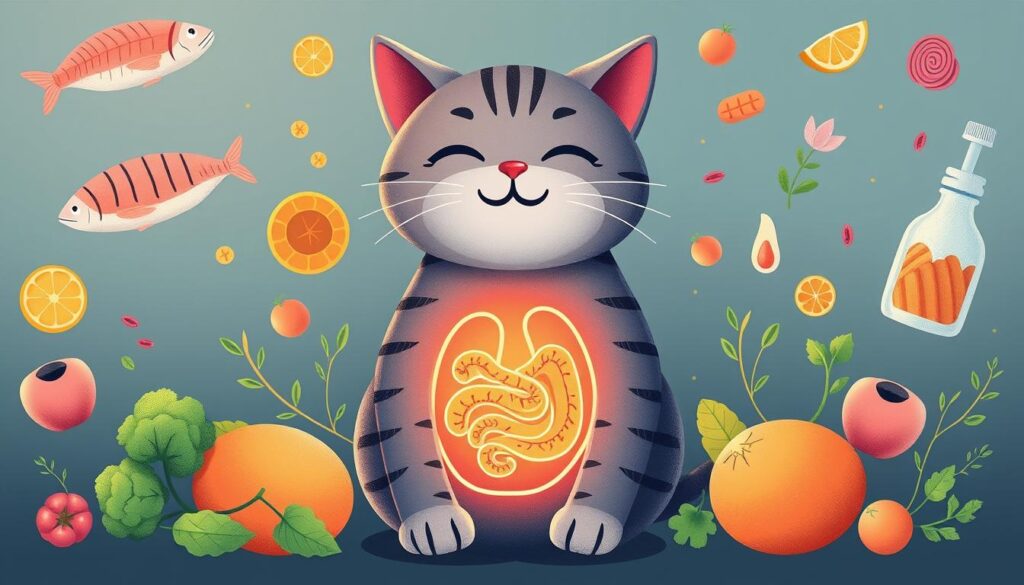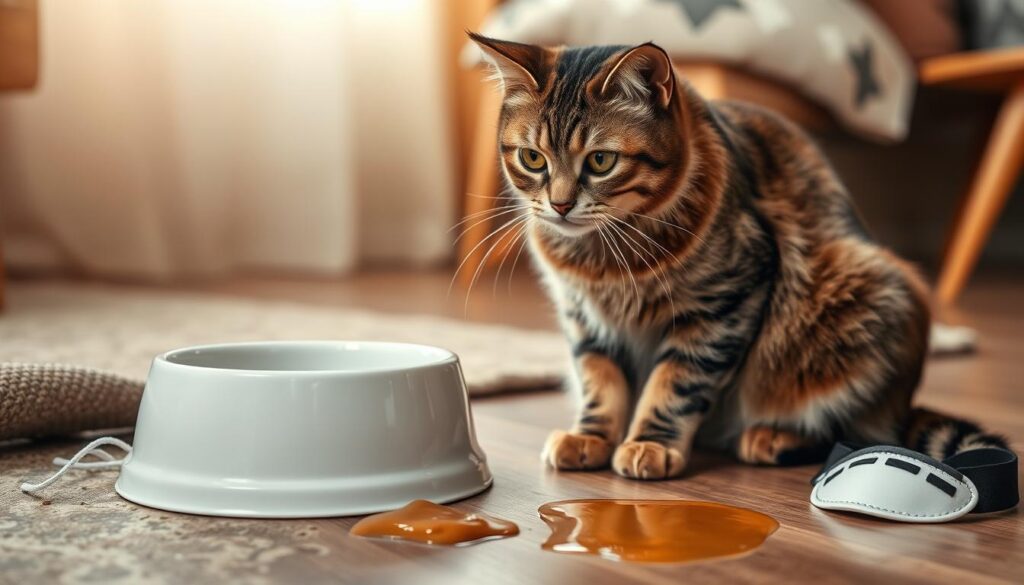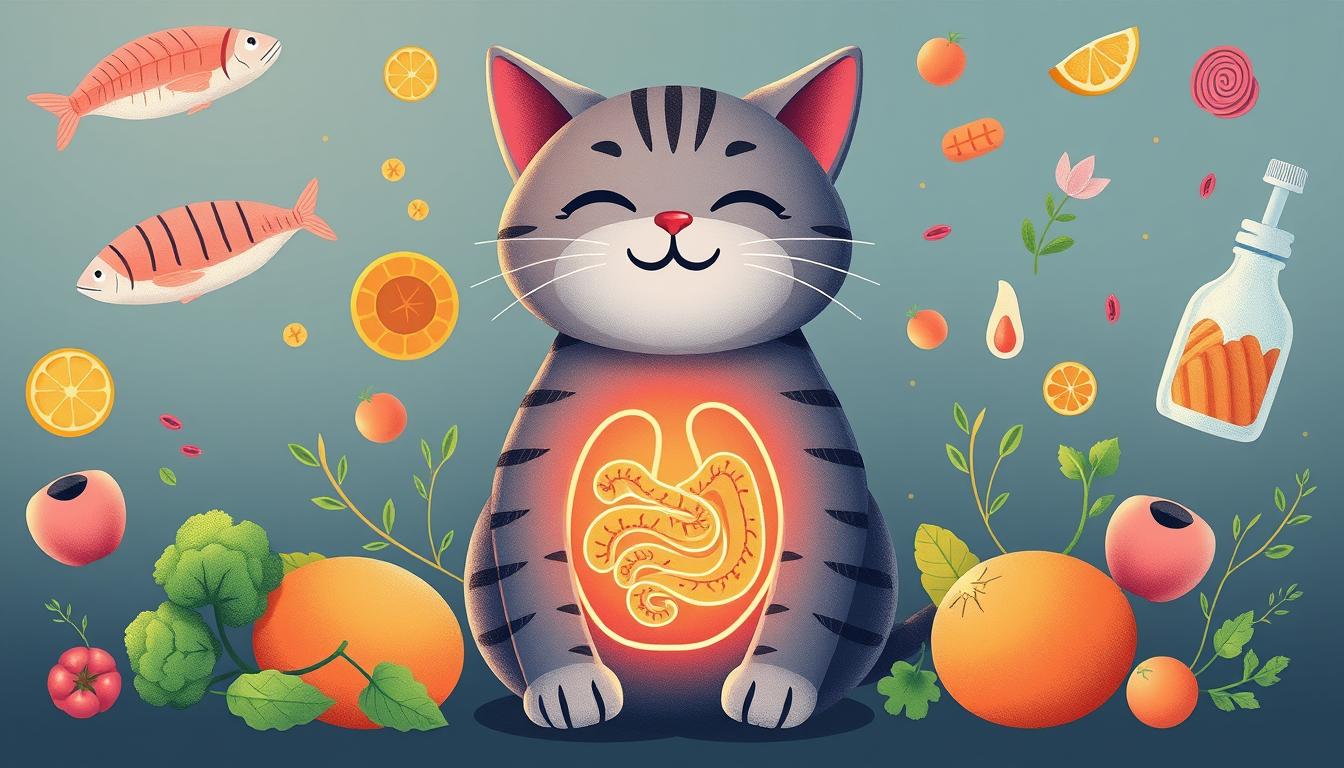As a devoted cat parent, you know your cat’s health is key. Seeing your cat with diarrhea worries you a lot. Diarrhea in cats is common but can be managed with the right steps.
This guide will cover types, symptoms, and causes of cat diarrhea. We’ll also look at home remedies and vet treatments. Knowing more about cat diarrhea helps you keep your cat happy and healthy.
Table of Contents
Understanding Cat Diarrhea: Types and Symptoms
As a cat owner, knowing about Kitten Diarrhea and Cat Loose Stools is key. It helps keep your cat’s Feline Gastrointestinal Health in top shape. Cat diarrhea can be acute or chronic, each with its own signs.
Acute vs. Chronic Diarrhea
Acute diarrhea in cats usually lasts under 14 days. It might be due to new foods, intolerance, or minor infections. Chronic diarrhea, however, lasts longer, often showing a serious health issue like inflammatory bowel disease or hyperthyroidism.
Common Symptoms to Watch For
- Frequent, watery stools
- Straining to defecate
- Changes in stool color or consistency
Stool Color and Consistency Guide
Watching your cat’s stool color and consistency is important. It can hint at the cause of their diarrhea:
- Red or black stools may mean bleeding, from the upper or lower GI tract.
- Yellow or green stools could point to liver issues or bacterial growth.
- Mucus-coated feces might show inflammation or a parasitic infection.
If your cat’s diarrhea doesn’t stop or worries you, see your vet. They can diagnose and treat it right.

Most Common Causes of Cat Diarrhea
Cat diarrhea can come from many sources. This includes changes in diet, food allergies, and even serious health issues. Knowing what causes feline digestive problems is key to helping your cat feel better.
Some of the most common causes of cat diarrhea include:
- Colitis is an inflammation of the colon
- Parasitic infections like roundworms, hookworms, or giardia
- Viral infections such as feline coronavirus or panleukopenia
- Stress or anxiety due to changes in environment or routine
- Intestinal cancer or other gastrointestinal diseases
- Sudden changes in diet or treats
- Eating garbage, spoiled food, or toxic substances
- Liver or kidney disease
- Bacterial infections like salmonella or E. coli
- Pancreatitis, or inflammation of the pancreas
- Ingestion of foreign objects like toys or fabric
If a cat has more than two episodes of diarrhea in a row, it’s a sign of a bigger problem. Cats showing symptoms like vomiting, weakness, or blood in their stool need to see a vet right away.
Chronic or recurring diarrhea in young, old, or weak cats is a serious warning sign. It’s important to get a vet’s help to find the cause and treat it properly.
When to Be Concerned About Your Cat’s Diarrhea
While cats can have occasional diarrhea, long-lasting or severe cases might mean a health problem. As a cat owner, knowing when to worry is key. Let’s look at when your cat’s stomach issues need vet attention.
Emergency Warning Signs
If your cat shows any of these signs, get vet help fast:
- Bloody diarrhea
- Severe lethargy or weakness
- Complete loss of appetite
- Signs of dehydration, such as dry mucous membranes or sunken eyes
High-Risk Cat Categories
Some cats are more at risk for serious diarrhea issues:
- Kittens and senior cats, whose immune systems may be more vulnerable
- Pregnant or nursing cats, who require extra nutritional support
- Cats with chronic health conditions, such as inflammatory bowel disease or diabetes
Signs That Require Immediate Vet Care
Even without emergency signs, see a vet if your cat’s diarrhea:
- Persists for more than 24-48 hours
- Is accompanied by vomiting
- Causes signs of pain or distress, such as straining or crying during bowel movements
Quick diagnosis and treatment are crucial for cat diarrhea and feline gastrointestinal health. Being watchful and getting vet help when needed helps your cat feel better.

Safe Home Remedies for Cat Diarrhea
If your cat has mild Cat Diarrhea, you can try some safe home remedies. But, always talk to your vet first. This is especially true for kittens, older cats, or those with health issues.
First, stop feeding your cat for 12-24 hours. Make sure they have lots of fresh water. This lets their stomach rest and can fix Feline Digestive Issues. After the diarrhea stops, start feeding them a simple diet like boiled chicken and rice.
Adding fiber like canned pumpkin (not pie filling) to their food can also help. Probiotics made for cats can help balance their gut bacteria and improve digestion.
- Don’t use human meds like Pepto-Bismol or Kaopectate on cats.
- Don’t try home remedies without your vet’s okay.
If your cat’s diarrhea lasts more than a couple of days, or if they show other bad signs like vomiting, tiredness, or not wanting to eat, get vet help fast. Your vet can find out why and treat your cat right.
“Always consult with your veterinarian before trying any home remedies, especially for kittens or cats with underlying health conditions.”
Dietary Management and Food Changes
Managing your cat’s diet is key in treating and preventing cat diarrhea. When changing your cat’s food, do it slowly over 7-10 days. This helps avoid upset stomachs. Cats with diarrhea might do better on a low-fat, easy-to-digest food for a while.
Transitioning to New Foods
Changing your cat’s diet too fast can cause problems like diarrhea. Cats’ intestines get used to a certain diet. Sudden changes can upset their stomachs. Start by adding a small amount of new food (5-10% of their meal) and gradually increase it every other day.
Recommended Diet Modifications
Some cats might need hypoallergenic or low-antigen diets if they react badly to their current food. Talk to your vet to find the right diet for your cat’s cat diarrhea treatment and feline gastrointestinal health.
Fiber and Probiotic Supplements
- Fiber supplements like psyllium or canned pumpkin can help firm up stools and support healthy digestion.
- Probiotic supplements can also aid in supporting your cat’s gut health and reducing the risk of diarrhea.
Always check with your vet before making big changes to your cat’s diet or adding supplements.
“Ensure your cat has constant access to fresh, clean water by regularly refilling their water bowls to prevent dehydration.”
Veterinary Diagnosis and Treatment Options
If your cat has persistent or severe diarrhea, you need to see a vet. They will do a full check-up and might suggest tests to find out why your cat is sick. This is important for treating Feline Digestive Issues.
Tests for Cat Diarrhea Treatment could be:
- Fecal tests to check for parasites, bacteria, or infections
- Blood work to see how your cat is overall and check for other health problems
- Imaging studies like ultrasounds or X-rays to look at the digestive system
After finding out why your cat has diarrhea, the vet will make a special plan. The plan might include:
- Medicines for infections or parasites, like antibiotics or anti-parasitic drugs
- Anti-inflammatory drugs to lessen inflammation in the intestines
- Probiotics to help the good bacteria in the gut
- Special diets to help the digestive system
In serious cases, your cat might need to stay in the hospital. They might get IV fluids and other care to prevent dehydration. Your vet will work with you to find the best treatment for your cat.
“If home remedies for cat diarrhea don’t work within 48 hours or symptoms worsen, contact your veterinarian.”
It’s very important to get your cat to the vet quickly for Cat Diarrhea Treatment. With the right care, your cat can feel better and be happy again soon.
Prevention Strategies for Cat Diarrhea
Keeping your cat’s digestive system healthy is key to avoiding diarrhea. Make sure your cat eats a consistent, balanced diet that fits their age and health. Avoid sudden diet changes or giving them too many treats, as this can upset their digestive balance.
Maintaining Proper Diet
A balanced diet is vital for your cat’s health. Choose high-quality cat food and avoid changing it too often. If you must switch foods, do it slowly over a week to help your cat’s system adjust.
Regular Health Screenings
Regular vet visits and fecal tests are important. They help catch problems early. Your vet can spot issues like parasites or food allergies that might cause diarrhea. Catching these early can help keep your cat healthy and prevent diarrhea.
By keeping your cat’s diet consistent and up with their health care, you can lower the chance of diarrhea. This helps keep their digestive system in top shape.
Recovery and Aftercare Guidelines
Getting better from cat diarrhea takes time and effort. It’s important to stick to your vet’s treatment plan. This might include medicines, changes in diet, and extra care to help your cat’s stomach get better.
Make a quiet, cozy spot for your cat to rest and get better. Slowly add their usual food back over 5-7 days as they start to feel better. Watch how much water they drink and their litter box use closely during this time.
- Give any medicines your vet says to give.
- Keep your cat’s environment calm and stress-free.
- Slowly bring back their usual food over a week.
- Watch their water intake and litter box use closely.
Go back to your vet as they suggest, especially if there were odd test results or if the feline digestive issues keep coming back. Your vet might want to see your cat more often to make sure they’re fully recovered and to stop future cat diarrhea.
By working with your vet and taking good care of your cat, you can help them get through this tough time. Remember, being patient and careful is very important during this period.
Conclusion
Knowing about cat diarrhea and how to treat it is key for cat owners. Mild cases can be handled at home, but watch for signs that need vet help. Keeping your cat’s diet right and getting regular vet visits are important.
Don’t hesitate to see a vet if your cat has bad diarrhea. They can help your cat get better fast. Taking care of your cat’s health means they can live a happy life.
Understanding cat diarrhea is vital for pet owners. Work with your vet and follow their advice to help your cat. This way, your cat can stay healthy and happy.


1 thought on “Causes and Treatment for Cat Diarrhea: A Quick Guide”
Comments are closed.